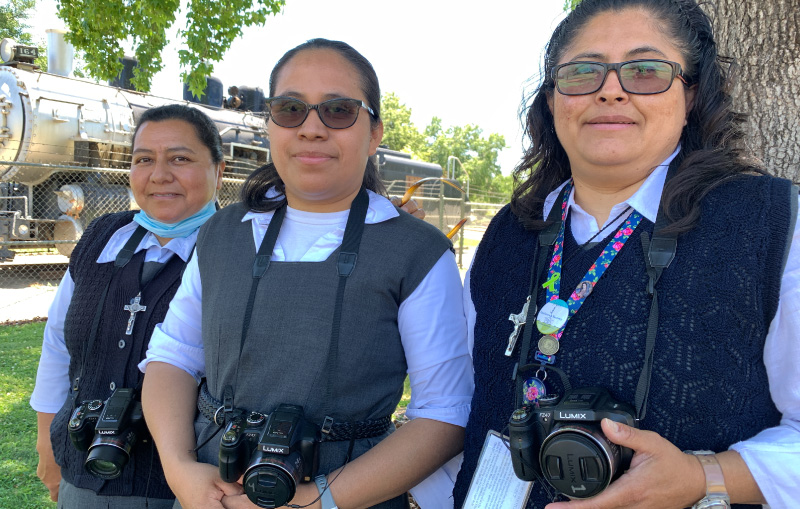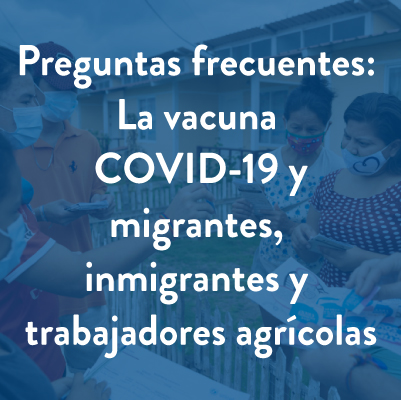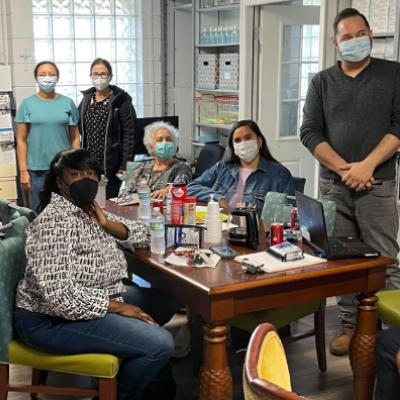- Who We Are
- Clinician Employment
- Publications
- Witness to Witness (W2W)
- El Premio Kugel & Zuroweste a la Justicia en la Salud
- Your Voice Matters: Photovoice Project
Thu, 06/17/2021 | by MCN Admin


Sister Zuly, Sister Antonia, and Sister Ana, three participants in Tu voz importa, received their cameras during the first workshop this week.
This week, 29 participants gathered for a beginner’s workshop on photography. But this was a particularly unusual photography workshop: all the participants are members of the migrant or immigrant communities in the Sacramento Valley region, they each received a professional-grade camera to use for the duration of the project, and the participants can take photographs of whatever is most meaningful to them to share their lives. The workshop, the first in a series, is the culmination of over two years of work to launch Tu voz importa/Your Voice Matters, a photovoice project in Sacramento Valley, a collaboration between Migrant Clinicians Network and Robyne Hayes.
Hayes, a professional photographer and director of Tu voz importa, said that first workshop is always her favorite day. “It’s the whole reason I do this,” she said by phone on her way to the first workshop. “This is my fifth time doing it. I’m a photographer, so I use photography when it’s hard for me to explain who I am, so I love how powerful it is to open the door for others to talk about who they really are.” She added that then those stories can be shared with the larger community, and often issues that are going unaddressed in underserved communities like migrants can be seen in a new light. “Those photographs can bring empathy and understanding that words couldn’t do,” Hayes noted.
The participants, although all from migrant or immigrant families, are diverse. Partners for the project include the local affiliates of Migrant Education, a nationwide program dedicated to improving education for migrant children, and Promotores, a program of North Valley Catholic Social Service to provide community support for the health needs of Latinx and Hmong communities in the Sacramento Valley. Participants recruited by Migrant Ed are Latinx and Punjabi migrants in high school, ages 13 to 19. The teens will be split into male and female groups for their trainings. “We keep them separate because, especially at that age, the topics may be taboo, so you want to make sure they have a safe space to talk,” Hayes noted. A second group of Latinas from the farmworker community of Sacramento Valley will participate from Promotores. Many of these women have had difficult immigration journeys to the region, and then endured wildfires of recent years, including 2018’s Camp Fire which devastated the region, Hayes noted. After hearing of the project, several participants recruited their own daughters to join as well.
Hayes looks forward to seeing the varying perspectives that each participant brings. “The thing about photovoice is that it’s open-ended. It raises issues that you wouldn’t think about to ask,” Hayes said. “As organizers, we’re trying to determine, ‘are their needs being met? How are programs addressing their needs?’ But the most important thing at the end of the day is, do they have the opportunity to tell their story in the way they want to tell it?”
The local community has stepped up to support the project and its participants. Two organizations are loaning participants cameras, including a local charter high school. California State University, Chico will provide the exhibit space for the final presentations of participants’ work. The workshops are catered by local restaurants, that have donated their food.
“From the very beginning, I understood that the success of this project hinged on creating an entirely new network of community partnerships, which presented a challenge because this represented a real departure from our typical outreach efforts,” said Ashley-Michelle Papon, Development and Outreach Project Coordinator, who recruited businesses and organizations to support the project. “Fortunately for us, we put out a call for assistance, and the larger community answered with generosity beyond anything we could have possibly anticipated.”
Tu voz importa, two years in the making, did not look like it would survive the pandemic. Initial funding was finally granted in May 2020 – already deep into the COVID-19 shutdowns. The program shifted gears, developing an outdoor-only physically distanced workshop scheduled for August, but the California fires reduced air quality and stalled the project once more. The initial partner who was to recruit participants backed out after the stall, but Hayes and MCN pushed on. “It forced us to dig deeper and broader, and as a result, it really strengthened the project,” Hayes noted, with more and varied partners. The resulting group of participants is larger and from different backgrounds and life experiences.
The first day of the workshop focused on basic photography – how to use the camera, the ethics of taking photos, how to stay safe, and how to protect the identity of those whose photos will be taken. Then the participants will receive assignments. The first asks them to chronicle their day-to-day life, including the joys, challenges, and struggles. The second assignment will ask what community means to them and ask them to photograph their community.
At the first session, the excitement was palpable. Enjoying food donated by some of the premiere cooks and restaurants nearby, conversations started slowly, the confidence of each person gaining momentum between bites. The group of students exchanged names, chatted about the lives that would soon be documented in photographs, and at the direction of Hayes, drew stick figure self-portraits with varying degrees of artistic precision. Participants then selected a few images, cut out from nature and fashion magazines, to serve as inspiration for the moments of their own lives they will soon document in photographs. As part of the bonding process, Hayes guided the group to speak openly about their fears related to the risks of engaging in the project, soothing anxiety by handing each person a laminated card explaining the project with emergency numbers. Anxiety subsided, however, when each recipient was handed their own digital camera. Participants held onto their cameras, looking through the lenses and snapping different angles. Individual attempts at portraits recreating the angles and techniques of Hayes’ presentation quickly gave way to participants photographing each other. Hayes overheard one of participant tell project staff that it was the first time she had ever held a camera.
“It is almost as if the act of looking at another person through the camera lens made them see one another for the first time, with people who began the day as strangers ending the day as friends,” Papon said. “They are forever members of the same community by existing in the photographs they left behind for us to look at. It’s hard to imagine a more fitting illustration of what we hope this project is able to do for them and the community.”
Resources:
Learn more about Tu voz importa.
Visit Robyne Hayes’ website to see more of her work in other photovoice projects.
Donate to Tu voz importa to support this project.
Supporters:
MCN is grateful to the following supporters of Tu voz importa, through donations and services:
Centro Legal de la Raza
Bacio Catering
Broadway Heights
Butte County Office of Education – Migrant Education
Chico Natural Foods Cooperative
Community Housing Improvement Project
Gnarly Deli
Inspire School of Arts and Sciences
Northern Valley Catholic Social Services Promotores
Roots Catering & Restaurant
Safeway – Nord Avenue
The Handle Bar
The Hunger Trolley
Tres Hombres
UCEF – Friends of the Arts, in conjunction with BCAC.tv
Valene L. Smith Museum of Anthropology
Learn more about Tu voz importa.
Visit Robyne Hayes’ website to see more of her work in other photovoice projects.
Donate to Tu voz importa to support this project.
Supporters:
MCN is grateful to the following supporters of Tu voz importa, through donations and services:
California Humanities
Centro Legal de la Raza
Bacio Catering
Broadway Heights
Butte County Office of Education – Migrant Education
Chico Natural Foods Cooperative
Community Housing Improvement Project
Gnarly Deli
Inspire School of Arts and Sciences
Northern Valley Catholic Social Services Promotores
Roots Catering & Restaurant
Safeway – Nord Avenue
The Handle Bar
The Hunger Trolley
Tres Hombres
UCEF – Friends of the Arts, in conjunction with BCAC.tv
Valene L. Smith Museum of Anthropology
California HumanitiesCentro Legal de la Raza
Bacio Catering
Broadway Heights
Butte County Office of Education – Migrant Education
Chico Natural Foods Cooperative
Community Housing Improvement Project
Gnarly Deli
Inspire School of Arts and Sciences
Northern Valley Catholic Social Services Promotores
Roots Catering & Restaurant
Safeway – Nord Avenue
The Handle Bar
The Hunger Trolley
Tres Hombres
UCEF – Friends of the Arts, in conjunction with BCAC.tv
Valene L. Smith Museum of Anthropology
Got some good news to share? Contact us on our social media pages above.
Return to the main blog page or sign up for blog updates here.







